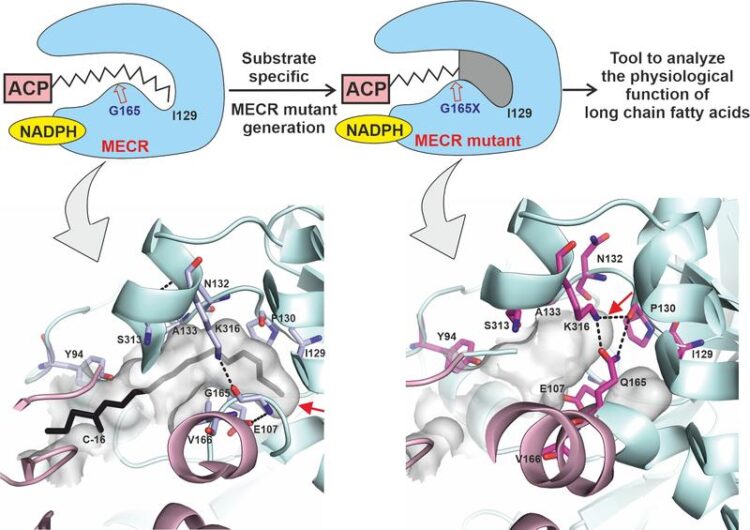As they live and breathe

Schematic representation of the wild-type and engineered MECR enzyme.
(c) University of Oulu, Finland
– the role of long-chain fatty acids in cellular respiration.
Cellular respiration is a complex and highly regulated process that allows cells to draw energy from nutrition. An international team of scientists in Finland, Germany and Poland have investigated the important role of long-chain fatty acids in guiding this process. The findings, published in the Nature Communications journal, will shed light on the understanding of mitochondrial function that involve disruptions in cellular energy metabolism.
They are tiny and highly efficient energy factories operating inside our cells. Often referred to as ‘powerhouses’, mitochondria extract most cellular energy from nutrition. Researchers from the University of Oulu, (Finland), the Heidelberg Institute for Theoretical Studies (HITS, Germany), and the University of Warsaw (Poland) have now succeeded in demonstrating how long-chain fatty acids regulate the amount of energy drawn in this process called cellular respiration. The discovery is ground-breaking as the importance of long-chain fatty acids produced by mitochondria in cellular respiration had not been previously known and the results open up a completely novel approach.
“This information helps us understand diseases that involve impaired mitochondrial function and cellular respiration much better than before,” says M. Tanvir Rahman from the University of Oulu and lead author on the Nature Communications paper.
The study is part of a more extensive research project investigating the connection between cellular respiration and the cell’s nutritional state. The scientists used a protein engineering method, in which the mutants of the so-called MECR enzyme involved in mitochondrial fatty acid synthesis were designed using computational molecular modeling, along with structure determination by crystallography, and other experiments to validate the predictions. “Our study is an example of a successful case of targeted protein modification,” says researcher Kaija Autio from the University of Oulu.
The experiments in this interdisciplinary study were carried out by biochemists and crystallographers from the Faculty of Biochemistry and Molecular Medicine of the University of Oulu and Biocenter Oulu, while the molecular modeling was done by computational biophysicists from the Heidelberg Institute for Theoretical Studies (HITS) and the University of Warsaw. ”This study really demonstrates the value of combining computational and experimental approaches to reveal complex biomolecular mechanisms” says Rebecca Wade from HITS.
The study has received funding from the Academy of Finland, the Sigrid Jusélius Foundation, the Jane and Aatos Erkko Foundation, the Mary and Georg C. Ehrnrooth Foundation, Finnish Cultural Foundation, the Klaus Tschira Foundation, the Polish National Science Centre, and the BIOMS Center for Modelling and Simulation in the Biosciences at Heidelberg University.
Publication:
Tanvir Rahman, M., Kristian Koski, M., Panecka-Hofman, J. et al. An engineered variant of MECR reductase reveals indispensability of long-chain acyl-ACPs for mitochondrial respiration. Nat Commun 14, 619 (2023). https://doi.org/10.1038/s41467-023-36358-7
Related scientific illustrations on request: kaija.autio@oulu.fi
Media contacts:
Meri Rova
Communications Specialist
University of Oulu
Phone: +358 294 485 478
meri.rova@oulu.fi
Dr. Peter Saueressig
Head of Communications
Heidelberg Institute for Theoretical Studies (HITS)
Phone: +49 6221 533 245
peter.saueressig@h-its.org
Wissenschaftliche Ansprechpartner:
Scientific contacts:
Kaija Autio, Docent, University Researcher
Faculty of Biochemistry and Molecular Medicine
University of Oulu
Phone: +358 50 546 28 64
kaija.autio@oulu.fi
M. Tanvir Rahman, PhD, Postdoctoral Researcher
Faculty of Biochemistry and Molecular Medicine
University of Oulu
Phone: +358 40 5032042
mohammad.rahman@oulu.fi
Prof. Dr. Rebecca Wade
Molecular and Cellular Modeling group
Heidelberg Institute for Theoretical Studies (HITS)
Phone: +49 6221 533 245
rebecca.wade@h-its.org
Dr. Joanna Panecka-Hofman
Faculty of Physics, University of Warsaw
Phone: +48 22 55 32281
jpanecka@fuw.edu.pl
Originalpublikation:
Tanvir Rahman, M., Kristian Koski, M., Panecka-Hofman, J. et al. An engineered variant of MECR reductase reveals indispensability of long-chain acyl-ACPs for mitochondrial respiration. Nat Commun 14, 619 (2023). https://doi.org/10.1038/s41467-023-36358-7
Weitere Informationen:
https://www.h-its.org/2023/04/17/cellular-respiration/ HITS press release
https://www.oulu.fi/en/news/they-live-and-breathe-role-long-chain-fatty-acids-ce… press release, University of Oulu, Finland
Media Contact
All latest news from the category: Life Sciences and Chemistry
Articles and reports from the Life Sciences and chemistry area deal with applied and basic research into modern biology, chemistry and human medicine.
Valuable information can be found on a range of life sciences fields including bacteriology, biochemistry, bionics, bioinformatics, biophysics, biotechnology, genetics, geobotany, human biology, marine biology, microbiology, molecular biology, cellular biology, zoology, bioinorganic chemistry, microchemistry and environmental chemistry.
Newest articles
Faster, more energy-efficient way to manufacture an industrially important chemical
Zirconium combined with silicon nitride enhances the conversion of propane — present in natural gas — needed to create in-demand plastic, polypropylene. Polypropylene is a common type of plastic found…

Energy planning in Ghana as a role model for the world
Improving the resilience of energy systems in the Global South. What criteria should we use to better plan for resilient energy systems? How do socio-economic, technical and climate change related…

Artificial blood vessels could improve heart bypass outcomes
Artificial blood vessels could improve heart bypass outcomes. 3D-printed blood vessels, which closely mimic the properties of human veins, could transform the treatment of cardiovascular diseases. Strong, flexible, gel-like tubes…




















